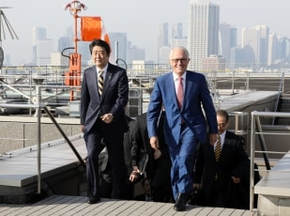 Source: http://www.mofa.go.jp/mofaj/a_o/ocn/au/page1_000470.html
Source: http://www.mofa.go.jp/mofaj/a_o/ocn/au/page1_000470.html As a result of the lowering of expectations (what one commentator called ‘noteworthy but not newsworthy’), foreign policy analysis has chosen to view this visit as a ‘missed opportunity’, or at the very least evidence that Japan and Australia still have some way to go before they become truly close security partners.
However one curious aspect of media commentary on PM Turnbull’s visit was the prevalent use of the term “alliance” to describe the relationship between Japan and Australia, despite it being obvious that Japan and Australia are not allies in the strict legal sense of the term. If “ally” somehow corresponds to “partner, colleague, or like-minded practitioner”, then Australia certainly has a lot of “allies” (to be fair, Australian politicians themselves sometimes use this term apparently without too much thought when they wish to describe close relations with another country, irrespective of whether an actual alliance exists with the country in question. Japanese commentators are more precise, preferring the term ‘quasi-ally’ and its ambiguity rather than any direct reference to an ‘ally’).
Other points raised in commentary wondered that if Australia was planning on becoming a major defence exporter, why didn’t it send Christopher Pyne to Japan along with PM Turnbull in order to further promote Australian defence exports? While timing issues and the fact that Pyne was already slated to visit India for talks with India’s Defence Minister ahead of the Raisina Dialogue might have played some role in diverting Pyne to the subcontinent, the fact that PM Turnbull visited Narashino base and was talking about the SDF use of the Bushmaster seemed like an opportunity missed for Australia’s defence industry, especially given the fact that Pyne has been very active in zipping about to other countries in the region selling the merits of Australia’s defence technology – but not Japan.
Nevertheless, the visit produced some significant outcomes showing how far the defence relationship has come between Japan and Australia. For starters, this year will see the first RAAF-JASDF exercise conducted in Japan (might it also be possible for Japan to participate in EX Pitch Black? Possibly, but two air force exercises in one year might be a bit much for both sides). Furthermore, in a first for an Australian PM, PM Turnbull was invited to visit the Narashino base, which is the principal base for Japan’s special forces units, and he sat in on a meeting of Japan’s NSC. As the press noted, these are privileges that are not bestowed on too many foreign leaders when they visit Japan, so clearly PM Abe wanted to make it clear to the Australians that he is prepared to actively include an Australian aspect to Japan’s defence apparatus at the highest levels.
The question now is whether Australia reciprocates this enthusiasm. Ever mindful of the watchful eye of China, PM Turnbull was very forthcoming in praise for China’s efforts vis-à-vis North Korea, and did not seek to portray China’s efforts in the South China Sea in a negative light, even suggesting that the situation there might be resolved (which sounds a tad over-optimistic). Meanwhile Turnbull and Abe were scathing in their comments towards North Korea, even suggesting that the world must not take the sudden thawing in North Korea’s attitude towards South Korea as an indication of a willingness by the North to discuss nuclear weapons. On this aspect of regional relations, at least Japan and Australia are seemingly in lock step.
Still, Turnbull’s presence at the Narashino base is a portent for what PM Abe might expect when he visits Australia next year – perhaps a visit to Victoria Barracks in Sydney will be in order to speak to the commando regiment there, or perhaps RAAF Base Glenbrook, or Garden Island to view Australia’s next generation naval fleet? At any rate, hopefully before then the RAA will be in place in order to facilitate a broader range of exercises between both countries, and who knows, both leaders might have a concluded TPP to spruik as they seek another avenue for cooperation.
 RSS Feed
RSS Feed